The Resurrection Timeline: The 3 Days AND 3 Nights Easter Doesn’t Want You to Know
To learn more about why you should not celebrate Easter get Your Free Booklet: "Easter: The Untold Story" https://bit.ly/43uhFoT Why is this free? We are determined to follow Jesus’ command too "freely give" (Matthew 10:8).
In the exposition delivered by the presenter, Mr. Weston, an insightful exploration into the multifaceted tapestry of Easter traditions unfolds, inviting viewers on a thought-provoking journey through historical corridors and scriptural interpretations.
Mr. Weston sets the stage by nostalgically reminiscing about his own childhood experiences of Easter, where the joyous festivities of egg decorating and treasure hunts obscured deeper questions about the holiday's true significance. However, he swiftly transitions into a probing inquiry, challenging viewers to critically examine the origins and implications of these beloved customs.
Drawing from historical sources and scholarly research, Mr. Weston unveils a fascinating narrative surrounding the etymology of Easter, uncovering potential links to ancient pagan goddesses such as Ishtar and Ostara. With meticulous attention to detail, he presents compelling evidence suggesting a historical fusion of Christian and pagan traditions, urging viewers to reevaluate their understanding of Easter's roots.
Central to Mr. Weston's discourse is a profound theological investigation into the timing of Jesus' crucifixion and resurrection. He adeptly navigates through biblical passages, highlighting Jesus' own prophecy of being in the tomb for "three days and three nights" as a pivotal benchmark for reassessing traditional chronologies. Through meticulous analysis, he challenges the conventional narrative of a Good Friday crucifixion followed by an Easter Sunday resurrection, proposing an alternative interpretation rooted in scriptural fidelity.
Moreover, Mr. Weston delves into the symbolic significance of the Passover in reshaping our understanding of Easter's timeline. By contextualizing Jesus' last supper within the framework of the Passover meal, he unveils a compelling narrative that reconciles biblical accounts with the requirement of "three days and three nights" in the tomb. This nuanced examination invites viewers to reconsider their preconceived notions and embrace a more authentic understanding of the Easter story.
As the presentation unfolds, Mr. Weston meticulously dissects Easter traditions such as egg hunts and rabbit symbolism, revealing their potential divergence from biblical teachings. With a blend of historical context and theological insights, he challenges viewers to engage in a critical reevaluation of these customs, encouraging a deeper alignment with the essence of Christian faith.
In conclusion, Mr. Weston's eloquent exposition serves as a catalyst for introspection and reconnection with the foundational truths of Easter. Through scholarly inquiry and spiritual reflection, he guides viewers towards a richer understanding of the holiday's significance.
Questions that this video will answer.
1. What historical evidence suggests a connection between Easter and pagan goddesses like Ishtar or Ostara, and how does this impact our understanding of the holiday's origins?
2. According to the biblical account, Jesus stated that he would be in the tomb for "three days and three nights." How does this statement challenge the traditional belief in a Good Friday crucifixion and Easter Sunday resurrection?
3. Could you elaborate on the significance of the Passover in relation to the timing of Jesus' crucifixion and resurrection, and how does this differ from the commonly accepted timeline of events?
4. In what ways do Easter traditions such as egg hunts, rabbits, and lilies contradict the biblical narrative of Jesus' resurrection, and why is it important to reassess these traditions in light of scriptural teachings?
5. How do linguistic and biblical analyses support the interpretation that Jesus was not crucified on a Friday and resurrected on a Sunday, as traditionally believed? What implications does this have for our understanding of Easter and its celebration?
-
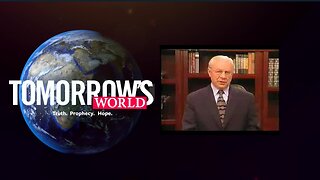 28:32
28:32
Tomorrow's World - Rumble
10 days agoShould You Be Baptized?
25 -
 1:02:19
1:02:19
In The Litter Box w/ Jewels & Catturd
17 hours agoERECTIONISTS! | In the Litter Box w/ Jewels & Catturd - Ep. 571 - 5/20/2024
14.7K20 -
 1:39:28
1:39:28
Crain and Company
2 hours agoEA College Football Trailer Drops + Trey Wingo Talks PGA Championship and Scottie Scheffler
1.08K -
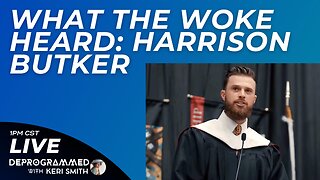 LIVE
LIVE
Deprogrammed with Keri Smith
2 hours agoWhat the Woke Heard: Harrison Butker's Speech - LIVE Deprogrammed with Keri Smith
1,389 watching -
 17:29
17:29
Breaking Points
7 hours agoBREAKING: Iran President DEAD In Helicopter Crash, What's Next?
72.4K121 -
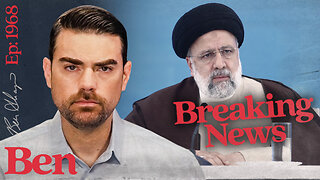 57:54
57:54
Ben Shapiro
4 hours agoEp. 1968 - IRANIAN PRESIDENT DEAD IN HELICOPTER CRASH
55.8K54 -
 2:40:45
2:40:45
Russell Brand
6 hours agoBREAKING: IRAN PRESIDENT DEAD! Murder or accident? - Stay Free #369
154K387 -
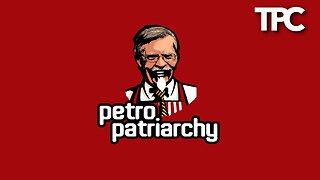 LIVE
LIVE
Tommy's Podcast
2 hours agoE458: CraigTV
472 watching -
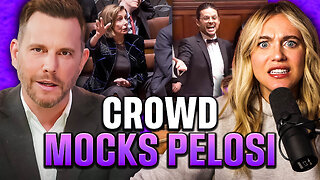 49:37
49:37
TENET Media
4 hours agoWinston Marshall Tricks Nancy Pelosi to Humiliate Herself | Dave Rubin & Isabel Brown
36.5K30 -
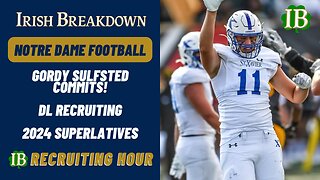 2:54:35
2:54:35
IrishBreakdown
4 hours agoNotre Dame Recruiting Hour: Gordy Sulfsted Commits, DL Recruiting Talk
30.2K